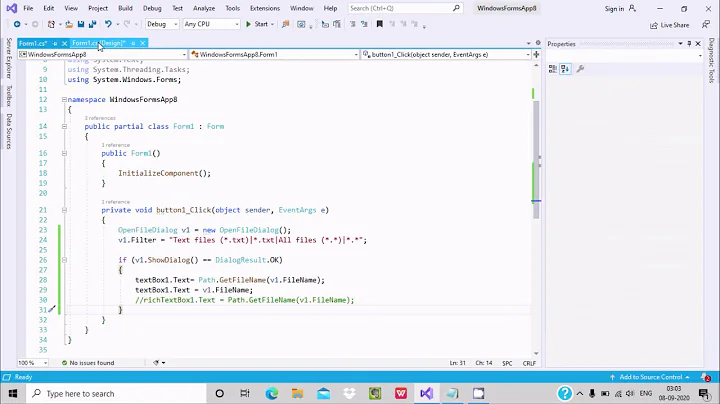Using / or \\ for folder paths in C#
Solution 1
Windows supports both path separators, so both will work, at least for local paths (/ won't work for network paths). The thing is that there is no actual benefit of using the working but non standard path separator (/) on Windows, especially because you can use the verbatim string literal:
string path = @"C:\" //Look ma, no escape
The only case where I could see a benefit of using the / separator is when you'll work with relative paths only and will use the code in Windows and Linux. Then you can have "../foo/bar/baz" point to the same directory. But even in this case is better to leave the System.IO namespace (Path.DirectorySeparatorChar, Path.Combine) to take care of such issues.
Solution 2
Please use Path.DirectorySeparatorChar OR better, as Poita suggested use Path.Combine.
Solution 3
I write paths in C# like this:
@"C:\My\Path"
The @ character turns off \ escaping.
EDIT a decade later
.NET now runs on Linux. Use Path.Combine() where feasible, otherwise use Path.DirectorySeparatorChar to construct a path with \ or / as appropriate to the underlying OS.
Solution 4
Use Path.Combine and you don't need to worry about such semantics.
Solution 5
This isn't a C# issue - it's a Windows issue. Paths in Windows are normally shown with a backslash: C:. In my opinion, that's what you should use in C#. Use @"C:\" to prevent special handling of backslaash characters.
Related videos on Youtube
Dominic K
Updated on August 31, 2021Comments
-
Dominic K over 2 years
When writing file paths in C#, I found that I can either write something like "C:\" or "C:/" and get the same path. Which one is recommended? I heard somewhere that using a single / was more recommended than using \ (with \ as an escaped sequence).
-
Dominic K over 14 yearsThanks to John Saunders for pointing out this is a Windows issue. I heard using / is better for cross-compatibility, which doesn't matter too much here as I'm targeting Windows.
-
Matti over 14 yearsBug in title: should be "/ or \\", not "// or \".
-
Dominic K over 14 years@sblom- Not sure the exact difference, but fixed since it works :p
-
-
Jay Bazuzi over 14 yearsWhat you're calling "raw string operator" is really "verbatim string literal".
-
Sam Harwell over 14 years
Path.PathSeparatoris a character to split paths in the PATH environment variable. On Windows it is;. I updated this answer to refer toDirectorySeparatorChar. -
 SolutionYogi over 14 yearsOops. Thank you for the correction, I did mean to post about DirectorySeparatorChar.
SolutionYogi over 14 yearsOops. Thank you for the correction, I did mean to post about DirectorySeparatorChar. -
 Vinko Vrsalovic over 14 years@Jay: "Verbatim string literal operator"? or just "Verbatim string literal"?
Vinko Vrsalovic over 14 years@Jay: "Verbatim string literal operator"? or just "Verbatim string literal"? -
 Mike Cole over 14 yearsIt's too bad that Path.Combine takes only 2 parameters.
Mike Cole over 14 yearsIt's too bad that Path.Combine takes only 2 parameters. -
jamil ahmed over 14 yearsEven if you're writing code to use on posix and Windows, you should still use the right one. There are many (third-party) abstractions to make this easy, one such being path_util in Chromium.
-
 Vinko Vrsalovic over 14 years@jeffamaphone: I agree. That's what I say in the final phrase, but in this case there's no need for third party abstractions.
Vinko Vrsalovic over 14 years@jeffamaphone: I agree. That's what I say in the final phrase, but in this case there's no need for third party abstractions. -
nawfal over 10 years@MikeCole since .NET 4.0, an overload takes any number of parameters via
paramskeyword. -
 Ellesedil about 7 yearsThere's a problem with the last paragraph where some sort of files like config files that contain text with directory paths could be generated on different OSes and then shared between them. Windows will want to use backslashes while Mac will expect forward slashes.
Ellesedil about 7 yearsThere's a problem with the last paragraph where some sort of files like config files that contain text with directory paths could be generated on different OSes and then shared between them. Windows will want to use backslashes while Mac will expect forward slashes. -
 Eric J. over 2 yearsTimes have changed, and .NET apps now run on Linux. I'd use Path.Combine() so that the runtime automatically selects the correct path separator.
Eric J. over 2 yearsTimes have changed, and .NET apps now run on Linux. I'd use Path.Combine() so that the runtime automatically selects the correct path separator.






![C# - How To Create File Or Directory In C# [ With Source Code ]](https://i.ytimg.com/vi/9zQzRAx66aM/hq720.jpg?sqp=-oaymwEcCNAFEJQDSFXyq4qpAw4IARUAAIhCGAFwAcABBg==&rs=AOn4CLAmYVxVT27PKnxLR6XVUcNbtfcwvg)



